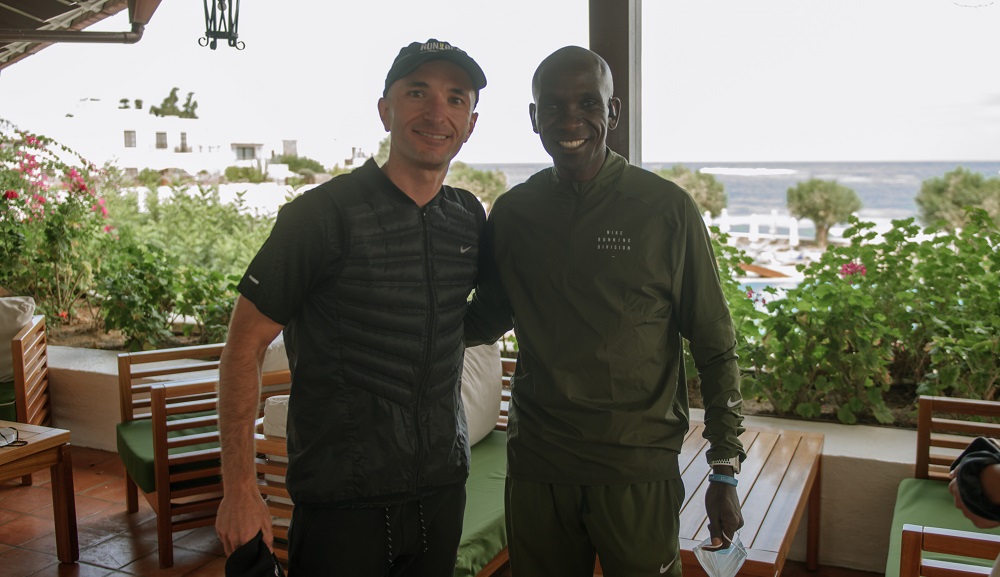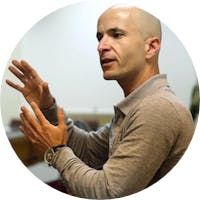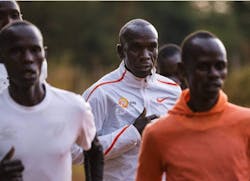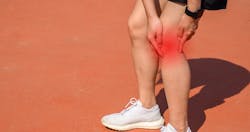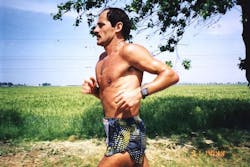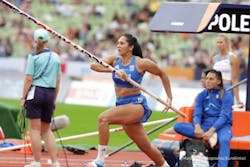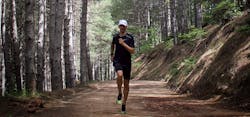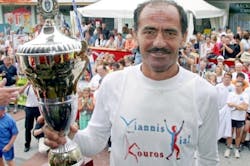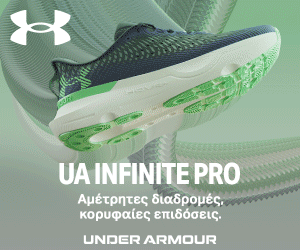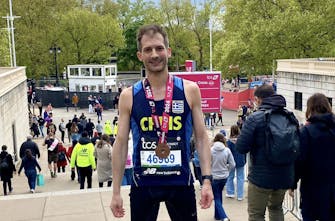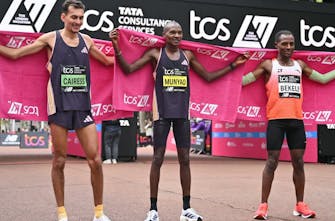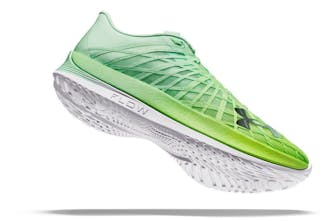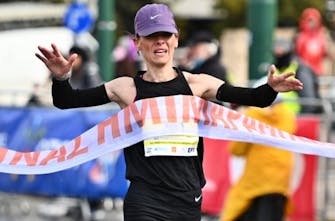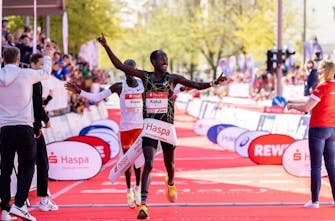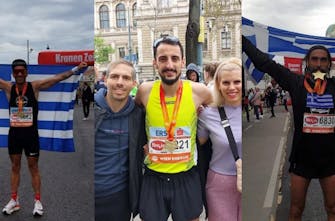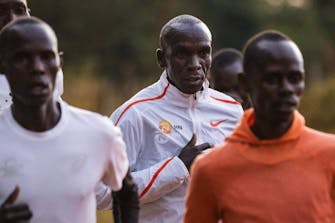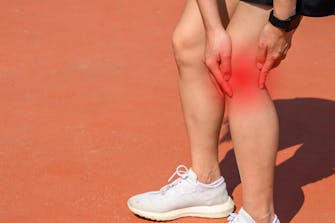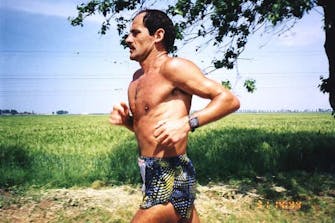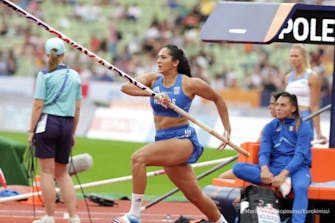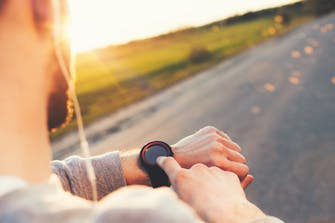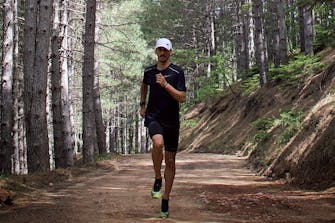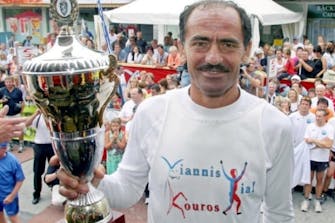Eliud Kipchoge at Runbeat: World exclusive interview with the best runner of all time (Vid - Pics)
Χρήστος Κώνστας 18:35 05-11-2021
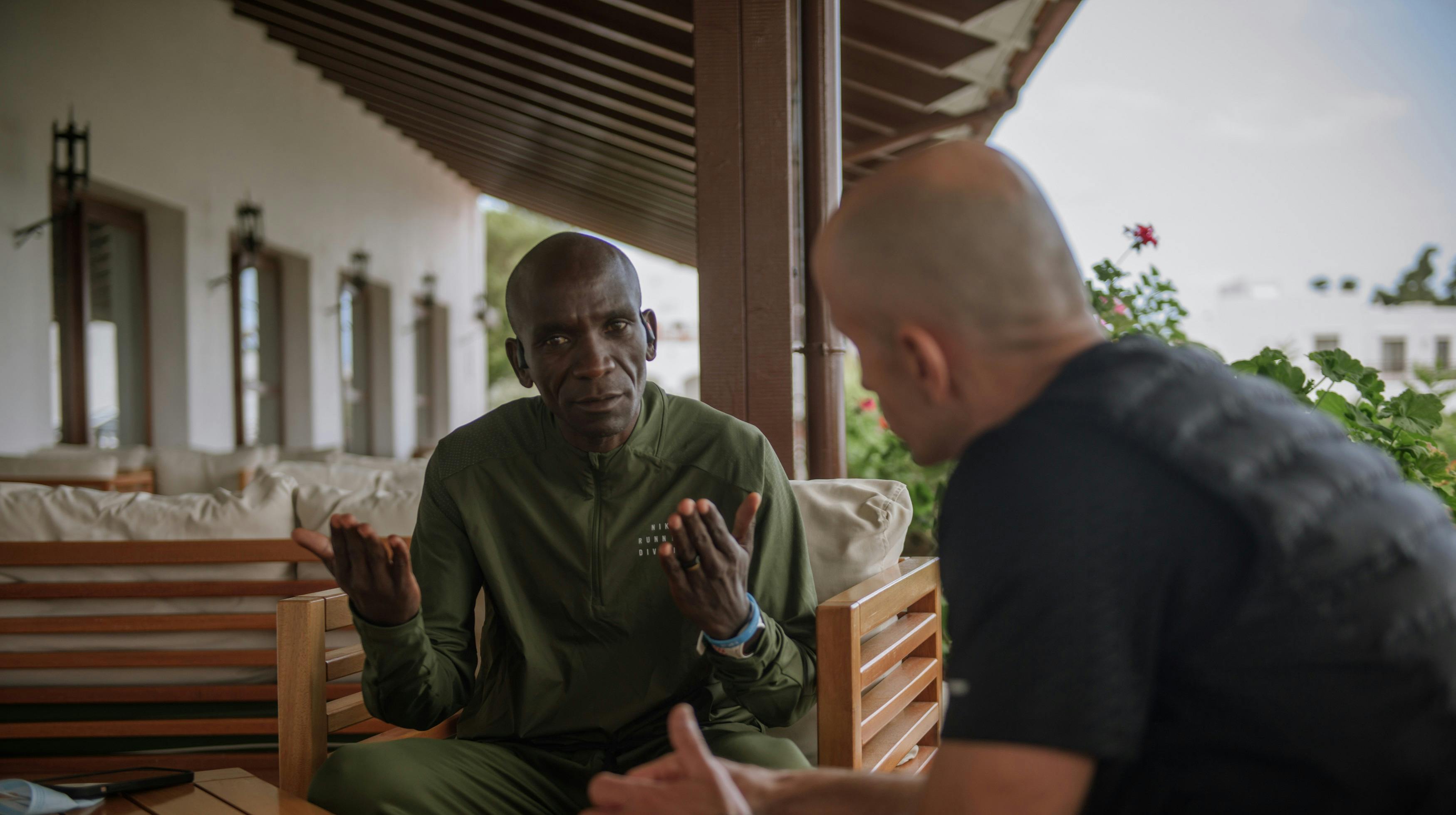
It’s a great honor for our team here at Runbeat to be one of the Non Sponsored Media in the world, to secure an interview with the best runner of all time, Eliud Kipchoge.
Thetwo-timeOlympic marathon champion (Rio 2016 – Tokyo 2021) and the world record holder in the same distance, talked for the first time ever in a Greek Media and its chief editor Christos Konstas, replying about everything all runners around the world would want to know.
Thefirstpersoninsports history to run a marathon in under 2 hours, accomplishing the message “No human is Limited”, talks about the honor of the award of the best athlete of the Tokyo Olympics from the ANOC, and what does it mean for him. He also does not hesitate to reveal everything we should know about his training.
The person that has won 13 of the 15 Major marathons that he ran from 2013 until now, recording another amazing stat that never happened before in marathon’s history, talked about his plans for the future, with news that will be commented worldwide. Will he race in the next Olympics in Paris? What is he going to do after the end of his career? Will he be involved in coaching and under which circumstances?
Greececould not be absent from this interview. Arelationship that was formed in 2004, when Kipchoge won his first Olympic medal in Athens. With a few days remaining for the Athens Authentic Marathon, Eliud Kipchoge responds in Runbeat’s question – challenge and says that he wants to run the course for at least once. Intheplace where it all begun 2.500 years ago and configured the world of marathon as it is today. Theworld that has made him the Greatest Of All Time.
We met Eliud Kipchoge in the 25th of October, just some hours after his awarding from the ANOC in Hersonissos, Crete.
Read the interview with “Armstrong of the Earth” – as he was characterized moments after breaking the barrier of 2 hours in the marathon distance.
Christos Konstas: Eliud it’s a great pleasure, but mostly a great honor to chat with you
Thank you
Eliud Kipchoge: Firstly, tell us about the last night and the title of the best athlete of Tokyo. What does it mean for you?
Actually, the award yesterday means a lot. It is a really unique award. All the federations of this world voted for me and decided that I am the best male athlete to be awarded yesterday. So it’s like the whole world actually decided to give me an award. Over 160 federations actually from countries that they participate in the Olympics and i'm not gonna say that It was a common award. Yesterday we had over 150 federations, which we can translate to over 150 countries which can be actually rare when it was given the reward. It was really good, I was overwhelmed to know that I am inspiring over 150 cultures that was there last night. It was a good time that shows that there is hope again. There were a lot of challenges, but it was good to happen for the Olympics, for the humanity and we shared that hope that we are moving forward.
C.K.: Last night the colleague asked you what does the marathon mean for you. You just said one word, "it’s life", why?
E.K.: Yes, marathon is life. When I say life, I mean that the marathon is a long event, it’s like life. We are being born and we can live in this world for 50 years, 100, 70, so it’s like life. In the marathon, you learn more, that training can endure you to pain and hurt and you can actually translate in to your life. You think positive, work hard for the sake of this world, work hard for the sake of our climate. We can take care of the climate to breathe better quality of air and train well. So, it’ s life. I think that in the future, the world will be all a marathon. Ifyou are actually training for a long time the ideas are coming in in order to develop this country, you can develop the whole world. You have positive ideas that are coming in, you feel the pain in your whole body when you are training and that’s what required. You feel good when you feel that pain. When you are sweat, when you are coming to the shower, when you get food, when you walk around, that’s life.
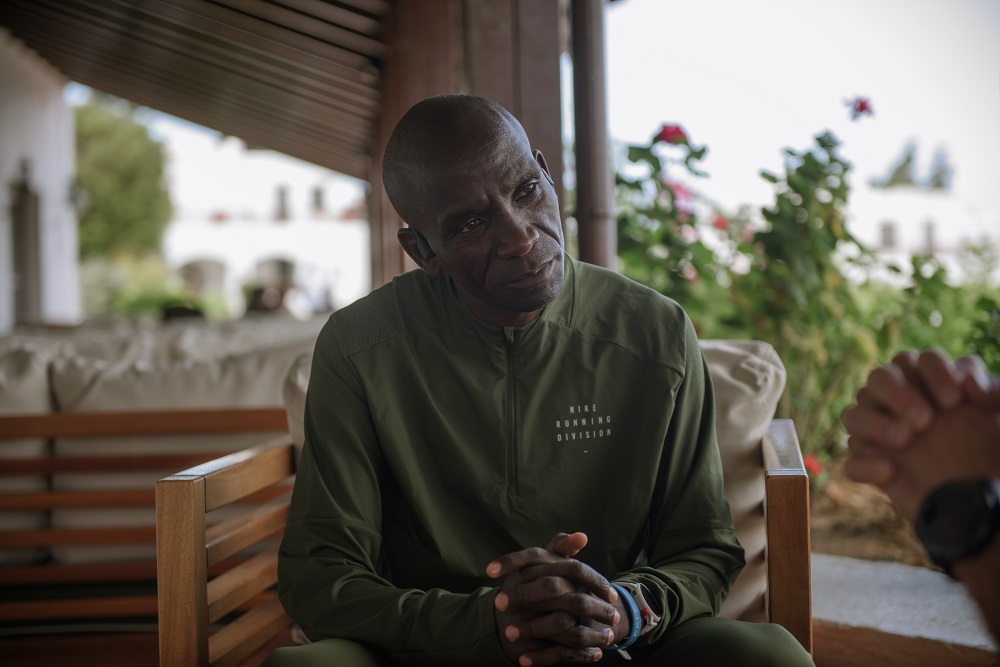
C.K.: So, best athlete of Tokyo, with back to back gold medals in marathon. Only two more marathoners have done that, Bikila and Ciepinski from Germany. Are you going to be the first and only with back to backbackgold medals in Paris? Is this your next target?
E.K.: I’ve not decided fully to tell, but Paris is still far.
C.K.: It’s not far, it’s only three years!
E.K.: Yes, it is not far, but it’s still three years. Many things are still around. A lot are in my list to run around. But I am happy to been appointed as an ambassador of the 2024 Olympics in Paris. I will be there, for these three years to inspire the next generation to work hard and to watch the Olympics of 2024. I believe the Olympics of 2024 will be unique, as many young people will come in, a lot of medals will be given out and that’s my target.
C.K.: Which are your greatest moments? At track and at marathon. Tell me why.
E.K.: In track actually my greatest moment when I won my first medal in Paris, in 2003. In marathon it’s the moment I run under two hours. That’s when I made history and I became the first human being to beat than barrier. I not only broke that barrier, but I wanted to tell the human families that nothing is impossible. You can walk on the impossibility and then the possibility, is to won.
C.K.: Many people, thousands, million people talk about Armstrong of the earth. Not Armstrong of the moon. Do you agree?
E.K.: I agree and I laugh at that. I am happy when I hear people saying and thinking like that. I want to instill the inspiration of positivity in this world. I will be a happy manwhen I get the world to be a runner’s world.
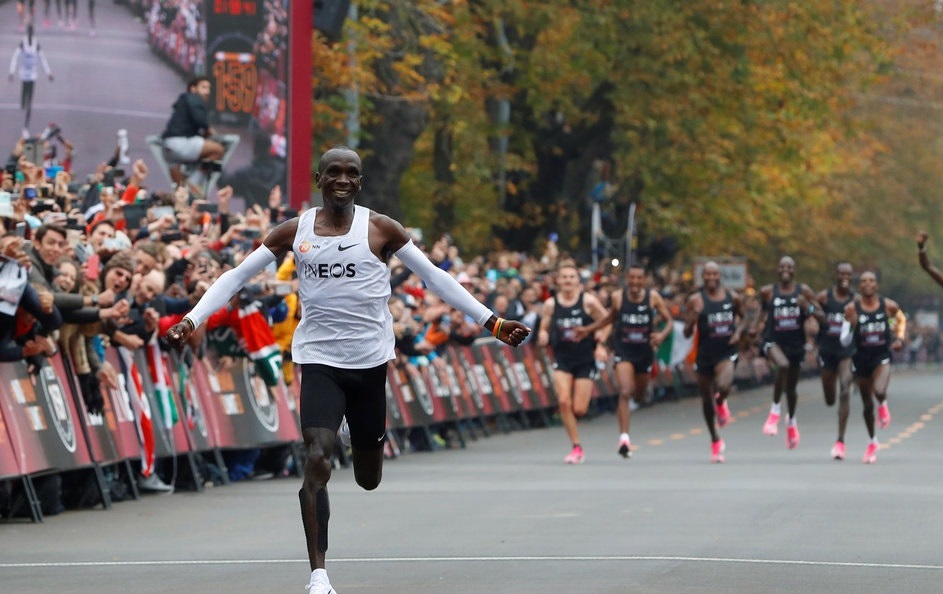
C.K.: I asked you about your greatest moments. Your first Olympic medal was at Athens in 2004. When will it be your last medal?
E.K.: I can’t say it now, but Athens was the best place to be, because it is the home of Olympics. I think that a few people who attended the Olympics in Athens can say “I have made history”. Because to be back in the home of Olympics is really different. To be back in the place where the Olympics were born, it really crucial. To participate and above all to compete is another thing.
C.K.: I will come back later at this point. As you know, runners all over the world are thirsty about your training details. I am thirsty, not only as a journalist, but mostly, as a marathon runner. You have travelled all over the world. You have the opportunity to train in the best camps of the world, but you use to train in Kenya. What do you think you can get there that does not exist in Europe or in the United States?
E.K.: Our camp is not magic science, is not rocket science. Our camp has small details. We have values that guide us. We follow those small things that improve us in a small an a small way, and in the end it really becomes something big. We have a camp that is being ruled by the values, the human values. The value of the family, the value of working hard, the value of team work, the value of positivity, the value of innovation, the value of knowledge, the value of curiosity to do something, the value to dare to think, the value to dare to think the unthinkable. We all have been covered by over 60 values and that what makes our camp different that many other camps in this world.
C.K.: What do you think are the elements that should determine a runner? Where do you think they should focus in order to see improvement?
E.K.: It’s simple. A runner should not focus on success. A runner should focus on preparation and running. If you prepare well, and plan well, you will be successful. Above all you should be self disciplined and try to be shellfish on other things that you need to relax instead of running around. Be more professional than an amateur. Above all, we should have trust and teamwork.
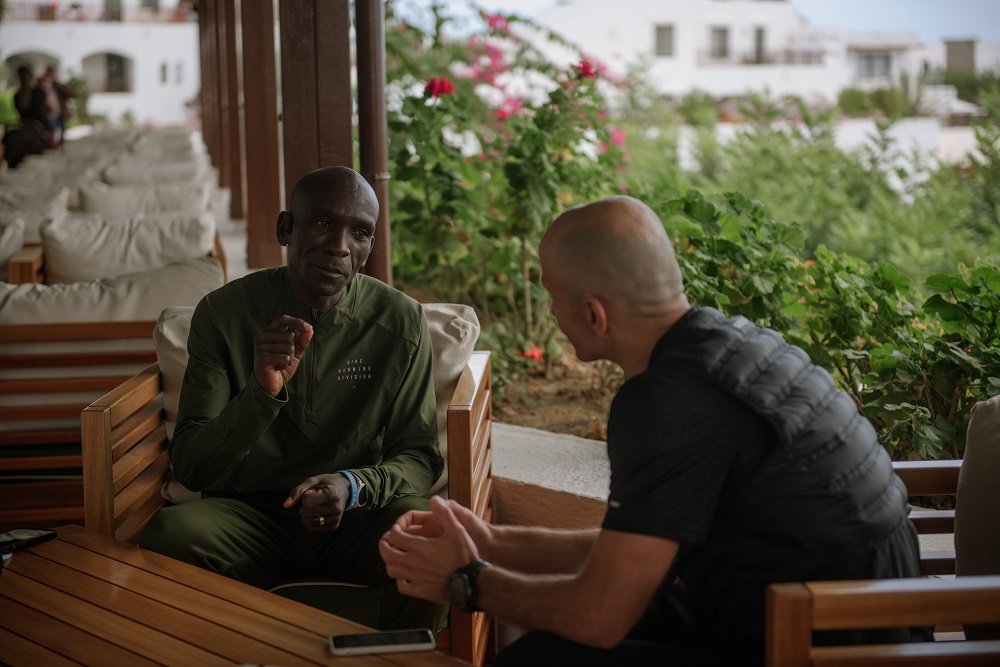
C.K.: Let me know more specific details. What is the role of muscle strengthening in your program? Are you in the gym all the months of a year? What kind of strengthening do you use to do?
E.K.: We have a different training philosophy. In the beginning of the seasonwe actually keep strength training by going to the gym and have some runs. After the first part of the month, we engage ourselves to more runs, especially long runs, strong runs and long speed works. So, we do it step by step, in blocks. As we are slowly approaching the last two months of the race, we work on our speed and in long runs. But our work is different. We mix speed and endure. That’s what makes us perform and stay high for a very long time.
C.K.: There are two basic training approaches to rhythm in the easy run. The approach that the easy run should be really easy and even more than one minute from the marathon pace and the approach that the easy runs should be close to the marathon pace, maybe 20-30 seconds slower. Which version do you follow and why?
E.K.: In the easy runs, we run really easy. When it’s fast, we run really fast.So we treat what’s required in the way that it’s required. When it is track training, we do it to the maximum, if it is fartlek, we to it to the maximum. In easy runs we really talk, we really run slowly to make sure we recover well.
C.K.: I saw your last recovery run was 5 or 6 minutes per kilometer?
E.K.: Five we think is okay. Five or six is good.
C.K.: Give us a picture about your weekly training plan
E.K.: I train for 200 to 220 kilometers per week, but normally I have three good days. I have a track session on Tuesday, a long run on Thursday and a fartlek on Saturday. All the other days I get breaths and quality recover from the runs, but every week I cover 200 kilometers.
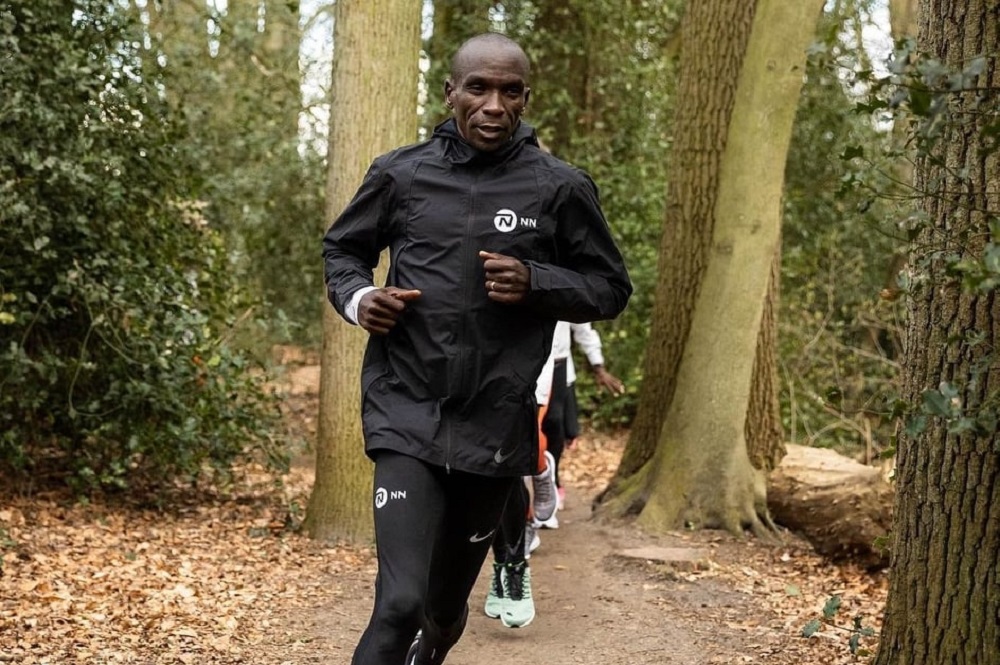
C.K.: How long is your period of tapering before the race? Ten days, two weeks?
E.K.: Oh yes, two weeks is okay.
C.K.: How crucial is the fueling before and during the training?
E.K.: It is very crucial. Before training, in training and after training.
C.K.: Even for the easy runs or not?
E.K.: We try to hydrate ourselves all the time, but during the hard sessions you really need to hydrate the day before and even during that hard time.
C.K.: Do you use to have a breakfast before easy runs or training?
E.K.: Sometimes before hard work like in long runs you don’t have breakfast. We try to have a Maurten gel on the way and I drink much sports drink.
C.K.: You have told that you are thinking about trying ultra distance races.
E.K.: Yes
C.K.: Is that right?
E.K.: That’s the right way to go. I really want to feel how it is running for four or five days, a very long time. For over 250 kilometers for five days, and run with other people. Just run for five days, enjoy and feel all this.
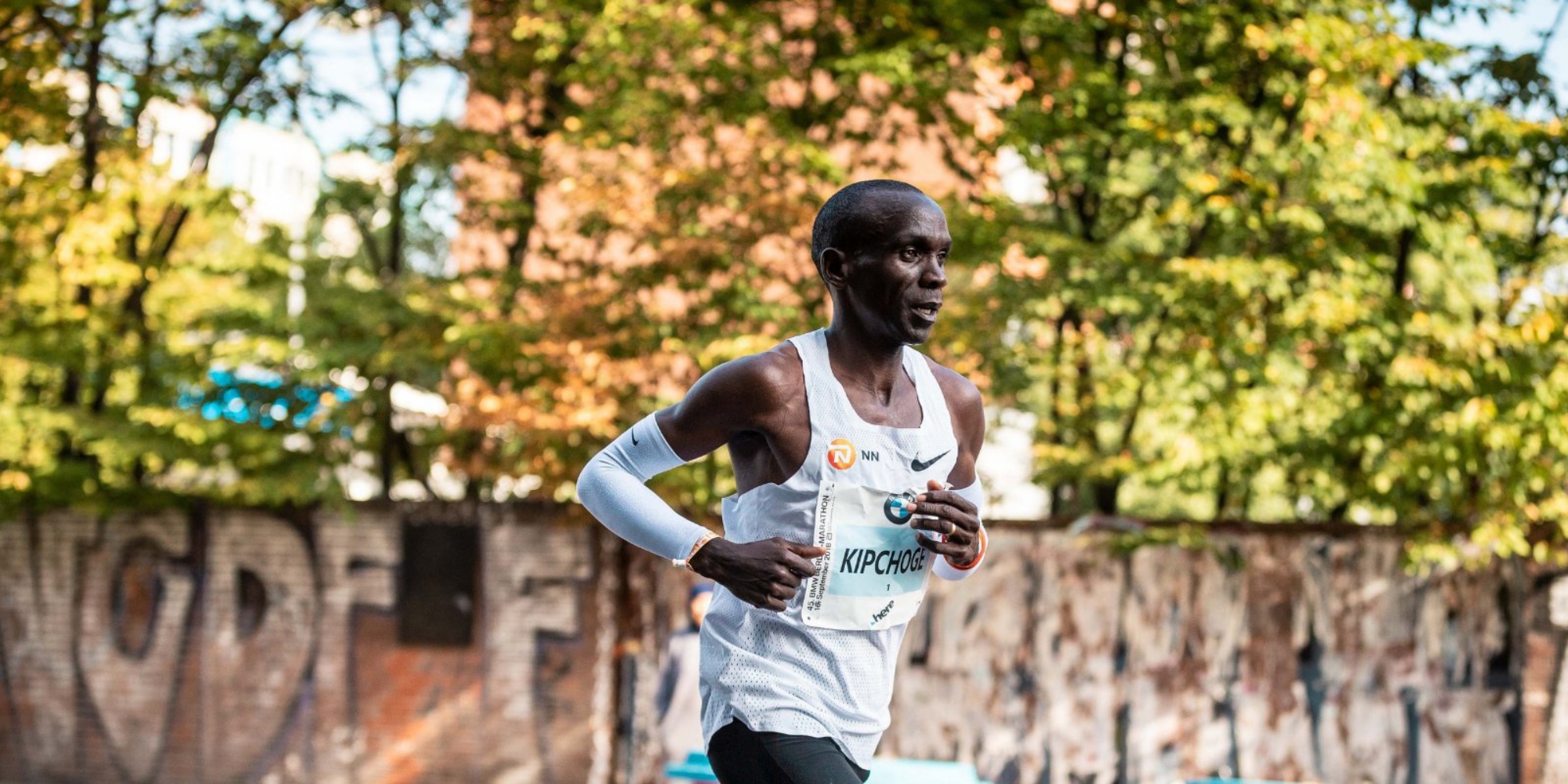
C.K.: Okay, the next step after your career as an athlete will be coaching?
E.K.: I think it will be part time coaching but I mainly want to go around the worldand inspire young people about running. To see the world as sports matter.
C.K.: How important is it to trust your coach? You have been connected too many years with Patrick Sang. Which are the keys for this relationship?
E.K.: The key is living in an honest way, with trust. You know trust can be the cement for an athlete and a coach to stay together.So it’s about living an honest life, being trustful, being faithful, working hard and being self disciplined and following the right program.
C.K.: Which is the role of the family?
E.K.: The role of the family is good. It’ s keeping you, you need support. You know, family is where we actually lean on. Also, when we have bad days, we go back to them. So family is truly crucial. That’s why everyone puts his heartin them.
C.K.: Last question. After thanking you for this great honor for giving us some time of your time, I would like to ask you one last thing. In Greece we usually say the following “If you want to run 42 kilometers, you can do it anywhere in the world. But if you want to run a marathon, you can only do it in Athens” because, as you know, you are dedicated to a sport whose roots are in Greece, in Athens. So I would like to ask you if we may see you in the future to run the Athens marathon.
E.K.: Oh yes, Greece has a lot of history. History that can bring us together. History that can bring all the people actually together. I believe that in the future I will come to Athens and run to feel how the home of marathon, the Hellenic Marathon is. Before I pull out of the sport I will come to Athens and run with the people, feel all the distance, inspire them and go back home.
C.K.: Eliud thank you so much for your time, thank you from Runbeat and thank you for all the runners around the world. Thank you.
E.K.: Thank you.
